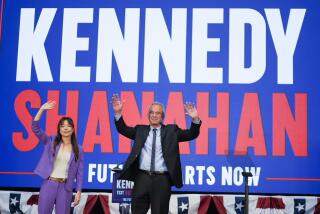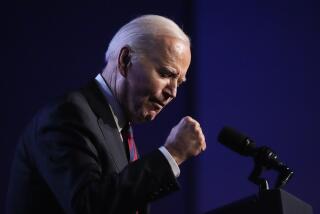2012 campaign’s missing ingredient: vision
In 1933, four years after a calamitous market crash, Americans were losing hope. But then, on a cold day in March,Franklin D. Rooseveltdelivered his first inaugural address.
The new president pulled no punches, laying blame for the country’s financial woes squarely on Wall Street speculators — and, by implication, on their benefactors in Washington. “They have no vision,” he said, citing a passage from the Bible, “and when there is no vision, the people perish.”
Roosevelt, by contrast, clearly articulated a vision that reawakened the hope of a beleaguered nation. He spoke that day of the country’s greatest need — putting people back to work — and he laid out a plan for achieving that goal.
COMMENTARY AND ANALYSIS: Presidential Election 2012
Decades later, when Americans faced a serious recession, Bill Clinton reflected on the same biblical passage when accepting the presidential nomination at the 1992 Democratic Convention. “I hope nobody … in our beloved country has to go through tomorrow without a vision,” he said. “I hope no one ever tries to raise a child without a vision. I hope nobody ever starts a business or plants a crop in the ground without a vision. For where there is no vision, the people perish.”
Americans today aren’t interested in slogans and sound bites. They want the candidates to offer them a vision, but so far neither Mitt Romney nor President Obama has done so.
Republicans are recycling tired promises from the Reagan era, preaching a gospel of small government and fiscal responsibility. But their words ring hollow. Republicans have been sounding that theme for decades, but they’ve never put it into practice. Reagan tripled the national debt.George W. Bush nearly doubled it, and left a legacy of debt from two unfunded wars and unfunded tax cuts that primarily benefit the wealthy.
As a messaging strategist who has worked with office-seekers and officeholders at all levels of government, including the presidency, I have closely examined the reaction of voters to the standard Republican narrative about taking care of “job creators” and eliminating “red tape that’s strangling business.” The response of voters across the political spectrum is lukewarm. Americans may yet elect Romney, but it won’t be because they really buy what he’s selling.
Voters aren’t hearing a clear message from Obama either. On the one hand, he’s pushing for more stimulus, but he is also the architect of a “grand bargain” that will cut more than $2 trillion from the 2013 federal budget, imposing the same kind of “austerity” that has proved so counterproductive in Europe.
So why hasn’t either candidate offered a clear vision that resonates with the American people?
One reason is that, in a time that requires boldness, the two presidential candidates are both cautious by nature. But there are other reasons as well.
One is the role of money in politics. Roosevelt attacked Wall Street in his first speech as president, and backed up his rhetoric with one piece of legislation after another to limit its power. He used government money to put Americans directly to work — something no one had dreamed of doing before — and created Social Security, a minimum wage and unemployment insurance. In today’s political culture, presidential candidates and legislators are beholden to Wall Street to support their campaigns, which has made the passage of such measures inconceivable.
The second reason for the paucity of vision is historical. For nearly 50 years, the Roosevelt legacy guided Democratic and Republican presidents alike. Dwight Eisenhower scoffed at the idea, proposed by his right flank, of dismantling New Deal programs, and instead expanded the role of the federal government by creating the interstate highway system. Richard Nixon greatly extended the federal government’s role in protecting the air we breathe and the water we drink by creating the Environmental Protection Agency.
Then came Ronald Reagan, who drew on his charisma to undo as much of what Roosevelt built as he could. He did so by sounding themes that resonated with voters.
One was based on a legitimate concern that once a government program was created, it developed barnacle-like constituencies that made it as difficult to dismantle as a barrier reef. A second theme was racial, with talk of Cadillac-driving “welfare queens.” This was a continuation of Nixon’s “Southern strategy” that served to solidify the GOP stronghold in the South. A third spoke to the aftershock of the 1960s, one of the most rapid periods of social change in history. This was a note that resonated with many Americans, particularly with white working-class males who’d been left frightened and angry by the women’s movement and affirmative action, which challenged them both at home and at work.
But at its heart Reagan’s critique was of a government that was too powerful, too large, too intrusive. What he didn’t mention was that the radical deregulation that he set in motion was also making government more corrupt with every passing campaign dollar. The result was a rising tide of inequality and insecurity for ordinary Americans unseen since the Depression.
Today, the parties and their standard-bearers continue to labor under the broken ideology of Reagan — an ideology that led, in the hands of George W. Bush, to the Great Recession of 2008. The struggles of working- and middle-class Americans four years later reflect the failure of any leader to transcend Reagan’s ideology. Romney continues to claim it as his own, while Obama hasn’t offered a coherent alternative.
In 1987, when Reagan’s vice president,George H.W. Bush, was considering a run for the presidency, he was casting about for campaign themes when a friend urged him to take some time to think about what vision he wanted to offer the American people. Oh yeah, Bush responded dismissively, “the vision thing.”
He was the only one-term Republican president in the last 80 years.
Drew Westen is a professor of psychology and psychiatry at Emory University and the author of “The Political Brain: The Role of Emotion in Deciding the Fate of the Nation.” His consulting firm, Westen Strategies, is not working for either candidate in this year’s presidential race.
More to Read
A cure for the common opinion
Get thought-provoking perspectives with our weekly newsletter.
You may occasionally receive promotional content from the Los Angeles Times.






